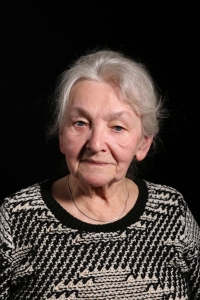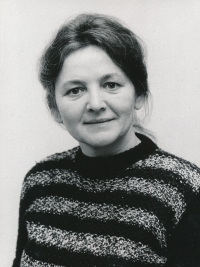I believed that the Soviet Union was our friend. 1968 was a complete breaking point in my life

Download image
The Germanist and radio editor Jana Ondřejčková was born Jana Honomichlová on 24 June 1942 in Nové Třebonice in the Prague-West district. Her father, František Honomichl, was an automobile fitter in Pragovka, Vysočany, while her mother was a housewife and later worked in agriculture. Jana grew up as the eldest of four sisters and was the only one to go to school. After graduating from the eleven-year school in Prague’s Vinohrady district in 1959, she was accepted to study German and Russian at the Faculty of Arts of Charles University (Charles University). She later found out that her working-class background had played a role in her acceptance to study a “Western” language, German. During her studies, she joined the Communist Party of Czechoslovakia (KSČ) in 1963, her guarantor being her German teacher and former diplomat Eduard Goldstücker. She soon married Jiří Ondřejček, a former professional soldier who worked as a technician at the Nuclear Research Institute in Řež and, like her, was a convinced communist. After graduating from university, she joined Czechoslovak Radio as a foreign editor in the editorial office in charge of broadcasts to German-speaking countries. The revelation of the crimes of communism during the Prague Spring meant a great sobering of the belief in communist ideology for both spouses. They were even more disillusioned by the invasion of Czechoslovakia by Warsaw Pact troops in August 1968. On the day of the invasion, the witness was present in the radio building under the pointing machine guns of Soviet soldiers. During party vetting at the beginning of normalisation, Jana Ondřejčková said that she disagreed with the entry of the troops and the normalisation process. For this she was expelled from the Communist Party of Czechoslovakia, but she appealed to the Central Committee of the Communist Party of Czechoslovakia and the decision was changed to a milder striking out. As a result, she kept her job in radio, but had to leave her editorial post and worked in the letters department. She was able to return among the editors after a while, and she also “covered” the work of some banned colleagues, such as Olga Jeřábková, with her name. In 1978 she had to undergo an abortion because she became pregnant at a time when her husband was apparently exposed to radioactive radiation at work. Jiří Ondřejček died in 1983 of cancer, which was probably a result of working with radioactive substances for a long time. Jana Ondřejčková left radio in 1991 when, following personnel changes, she found herself under pressure to take up a senior position which did not suit her. She began working as a guide for German tourists, a job she held until the outbreak of the covid pandemic. In 2025, she was still living in Prague.


